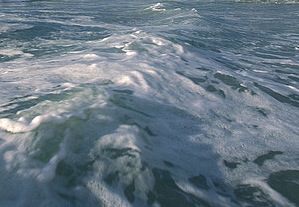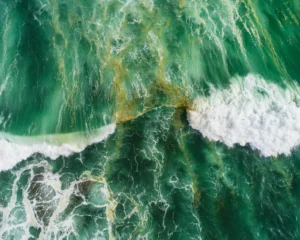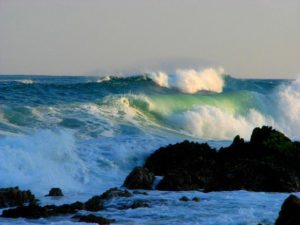Scientists Warn ‘Mass Extinction’ in Seas May Be Underway
The ocean may be mitigating some of the effects of global warming, but scientists say marine life is mortally threatened as the ocean becomes increasingly acidic, less oxygenated and warmer. And it's happening at a much faster pace than previously known.
Remember the articles about how the ocean was absorbing more carbon and heat, giving us a slight reprieve from the effects of global warming? Not so good for the ocean, it turns out. Scientists from the International Programme on the State of the Ocean warn in a new report that the seas are changing much more rapidly than previously thought, and becoming increasingly inhospitable to life.
The ocean is shielding us from the worst effects of accelerating climate change by absorbing excess CO2 and heat from the atmosphere. The twin effects of this — acidification and ocean warming — are combining with increased levels of deoxygenation, caused by nutrient run-off from agriculture near the coast, and by climate change offshore, to produce what has become known as the ocean’s ‘deadly trio’ of threats whose impacts are potentially far greater because of the interaction of one on another. The scale and rate of this change is unprecedented in Earth’s known history and is exposing organisms to intolerable and unpredictable evolutionary pressure.
This is no small thing. The scientists note that each of the earth’s five known mass extinctions was preceded by at least one of the “deadly trio” — acidification, warming and deoxygenation — and said they fear that “the next mass extinction” of sea life is already underway, the first in some 55 million years. Given the role of the ocean in the worldwide ecosystem, from the plankton that absorb sun energy to the fish we eat — more about that in a moment — the rapid poisoning of the seas will have grave consequences for nearly all species. “These impacts will have cascading consequences for marine biology, including altered food web dynamics and the expansion of pathogens,” the report said.
Some of these conclusions were contained in a 2011 IPSO report, but the new one says the changes underway are occurring at a much faster and more intense rate than previously believed.
And then there’s the overfishing and poor fisheries management to add another stressor to the biological health of the seas:
Continued overfishing is serving to further undermine the resilience of ocean systems, and contrary to some claims, despite some improvements largely in developed regions, fisheries management is still failing to halt the decline of key species and damage to the ecosystems on which marine life depends. In 2012 the UN FAO determined that 70% of world fish populations are unsustainably exploited, of which 30% have biomass collapsed to less than 10% of unfished levels. A recent global assessment of compliance with Article 7 (fishery management) of the 1995 FAO Code of Conduct for Responsible Fisheries, awarded 60% of countries a “fail” grade, and saw no country identified as being overall “good.”
They offer some potential steps to lessen the impact, but given the lack of international response to the looming ecological crisis, don’t expect much action in this issue, either. Still, the scientists says the world community should:
–Cut global carbon dioxide emissions enough to limit the global temperature rise to less than 2 degrees Celsius. They note that “current targets for carbon emission reductions are insufficient in terms of ensuring coral reef survival and other biological effects of acidification.” And they say that current models don’t include added effects on the atmosphere from methane release from a melted permafrost and coral dieback, which “mean the consequences for human and ocean life could be even worse than presently calculated.”
–Emphasize small-scale fisheries, seek regional cooperation for management of shared environments and ban “destructive fishing gear” with laws that are enforced.
— “Build a global infrastructure for high seas governance that is fit-for-purpose. Most importantly, secure a new implementing agreement for the conservation and sustainable use of biodiversity in areas beyond national jurisdiction under the auspices of” the United Nations Convention on the Law of the Sea.
—Posted by Scott Martelle.
Your support matters…Independent journalism is under threat and overshadowed by heavily funded mainstream media.
You can help level the playing field. Become a member.
Your tax-deductible contribution keeps us digging beneath the headlines to give you thought-provoking, investigative reporting and analysis that unearths what's really happening- without compromise.
Give today to support our courageous, independent journalists.






You need to be a supporter to comment.
There are currently no responses to this article.
Be the first to respond.